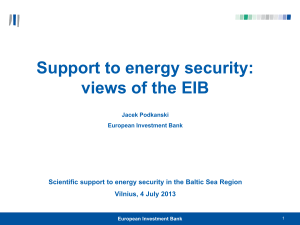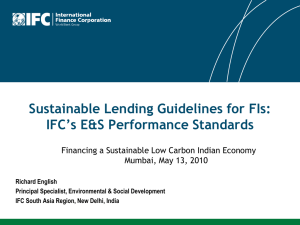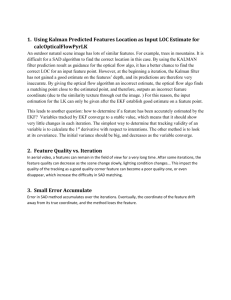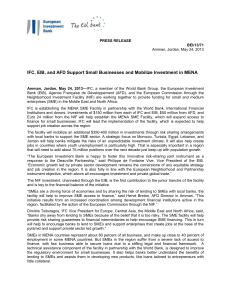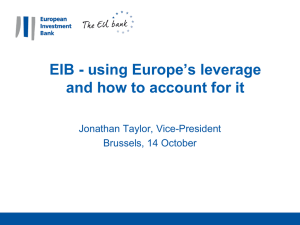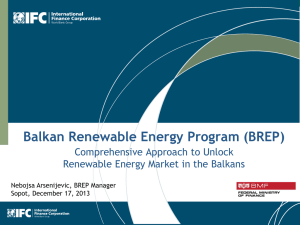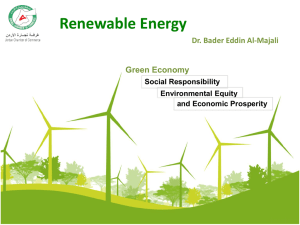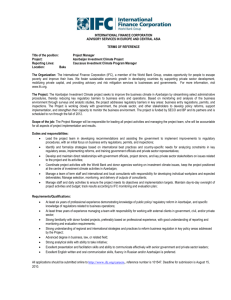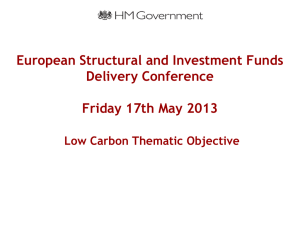full press release on the Tafila, Jordan, wind farm.
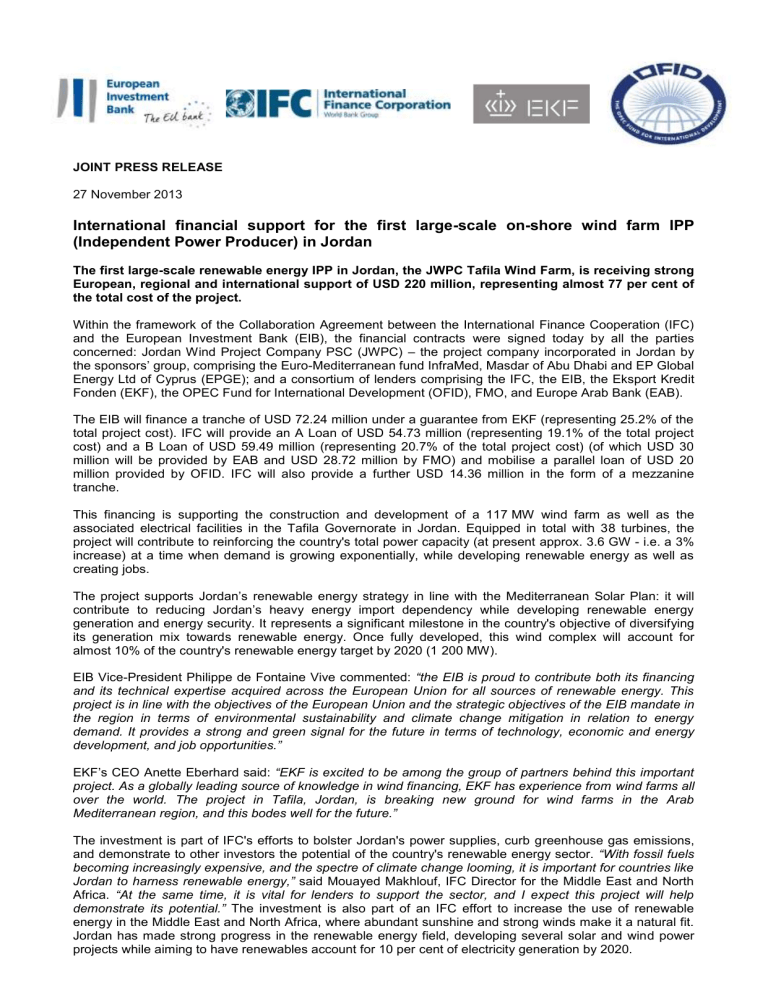
JOINT PRESS RELEASE
27 November 2013
International financial support for the first large-scale on-shore wind farm IPP
(Independent Power Producer) in Jordan
The first large-scale renewable energy IPP in Jordan, the JWPC Tafila Wind Farm, is receiving strong
European, regional and international support of USD 220 million, representing almost 77 per cent of the total cost of the project.
Within the framework of the Collaboration Agreement between the International Finance Cooperation (IFC) and the European Investment Bank (EIB), the financial contracts were signed today by all the parties concerned: Jordan Wind Project Company PSC (JWPC) – the project company incorporated in Jordan by the sponsor s’ group, comprising the Euro-Mediterranean fund InfraMed, Masdar of Abu Dhabi and EP Global
Energy Ltd of Cyprus (EPGE); and a consortium of lenders comprising the IFC, the EIB, the Eksport Kredit
Fonden (EKF), the OPEC Fund for International Development (OFID), FMO, and Europe Arab Bank (EAB).
The EIB will finance a tranche of USD 72.24 million under a guarantee from EKF (representing 25.2% of the total project cost). IFC will provide an A Loan of USD 54.73 million (representing 19.1% of the total project cost) and a B Loan of USD 59.49 million (representing 20.7% of the total project cost) (of which USD 30 million will be provided by EAB and USD 28.72 million by FMO) and mobilise a parallel loan of USD 20 million provided by OFID. IFC will also provide a further USD 14.36 million in the form of a mezzanine tranche.
This financing is supporting the construction and development of a 117 MW wind farm as well as the associated electrical facilities in the Tafila Governorate in Jordan. Equipped in total with 38 turbines, the project will contribute to reinforcing the country's total power capacity (at present approx. 3.6 GW - i.e. a 3% increase) at a time when demand is growing exponentially, while developing renewable energy as well as creating jobs.
The pro ject supports Jordan’s renewable energy strategy in line with the Mediterranean Solar Plan: it will contribute to reducing Jordan’s heavy energy import dependency while developing renewable energy generation and energy security. It represents a significant milestone in the country's objective of diversifying its generation mix towards renewable energy. Once fully developed, this wind complex will account for almost 10% of the country's renewable energy target by 2020 (1 200 MW).
EIB Vice-President Philippe de Fontaine Vive commented: “the EIB is proud to contribute both its financing and its technical expertise acquired across the European Union for all sources of renewable energy. This project is in line with the objectives of the European Union and the strategic objectives of the EIB mandate in the region in terms of environmental sustainability and climate change mitigation in relation to energy demand. It provides a strong and green signal for the future in terms of technology, economic and energy development, and job opportunities.”
EKF’s CEO Anette Eberhard said: “EKF is excited to be among the group of partners behind this important project. As a globally leading source of knowledge in wind financing, EKF has experience from wind farms all over the world. The project in Tafila, Jordan, is breaking new ground for wind farms in the Arab
Mediterranean region, and this bodes well for the future.”
The investment is part of IFC's efforts to bolster Jordan's power supplies, curb greenhouse gas emissions, and demonstrate to other investors the potential of the country's renewable energy sector.
“With fossil fuels becoming increasingly expensive, and the spectre of climate change looming, it is important for countries like
Jordan to harness renewable energy,” said Mouayed Makhlouf, IFC Director for the Middle East and North
Africa. “At the same time, it is vital for lenders to support the sector, and I expect this project will help demonstrate its potential.” The investment is also part of an IFC effort to increase the use of renewable energy in the Middle East and North Africa, where abundant sunshine and strong winds make it a natural fit.
Jordan has made strong progress in the renewable energy field, developing several solar and wind power projects while aiming to have renewables account for 10 per cent of electricity generation by 2020.
The lenders were advised by Chadbourne & Parke LLP and Khalifeh & Partners (Amman-Jordan), and the sponsors were advised by Nabarro LLP.
Note to editors:
About EIB
The EIB, through its facility for partnership with Mediterranean countries, FEMIP, has undertaken since 2002 to support in very tangible terms its partners’ economic and social development, in order to improve the living conditions of their citizens – an undertaking that has constantly been reaffirmed over the years, resulting in an overall investment at end-2012 of EUR 14.2 billion in support of the Mediterranean countries.
To support the changes happening in the Mediterranean, in 2012 EIB-FEMIP mobilised all of its resources to target projects bringing tangible improvements to local economies. This took the form of EUR 1.7 billion of new loans in the key sectors of industry, training, energy, transport, water and social housing. In tandem with these new commitments, EIB-FEMIP supported the real economy of the Mediterranean countries with EUR
1.5 billion worth of disbursements for on-going projects. In the private sector 200 firms received support, enabling the creation of nearly 10 000 jobs, with EIB-FEMIP providing the value added of its technical and financial know-how. 2012 confirmed EIBFEMIP’s role as the leading development financier in the
Mediterranean. www.eib.org/femip
About EKF
EKF strengthens the competitiveness of small and large Danish companies. As Denmark’s official export credit agency, EKF helps the foreign customers of Danish companies obtain financing and thus make it attractive for them to place orders in Denmark. EKF is owned by the Danish state and is operated as a modern financial institution on commercial terms. In 2012, EKF helped create or maintain more than 17 500
Danish jobs. www.ekf.dk/en
About IFC
IFC, a member of the World Bank Group, is the largest global development institution focused exclusively on the private sector. Working with private enterprises in more than 100 countries, we use our capital, expertise, and influence to help eliminate extreme poverty and promote shared prosperity. In FY13, our investments climbed to an all-time high of nearly $25 billion, leveraging the power of the private sector to create jobs and tackle the wo rld’s most pressing development challenges. For more information, visit www.ifc.org
Press contacts:
EIB
AnneCécile Auguin, +352 621 36 19 48, a.auguin@eib.org
Website: www.eib.org/press - Press Office: +352 4379 21000 – press@eib.org
EKF
Ole Lindhardt, ole@ekf.dk
, +45 35 46 26 78, +45 20 18 39 52
IFC
Riham Mustafa, Phone: +20 2 2461 4230, E-mail: RMustafa@ifc.org
